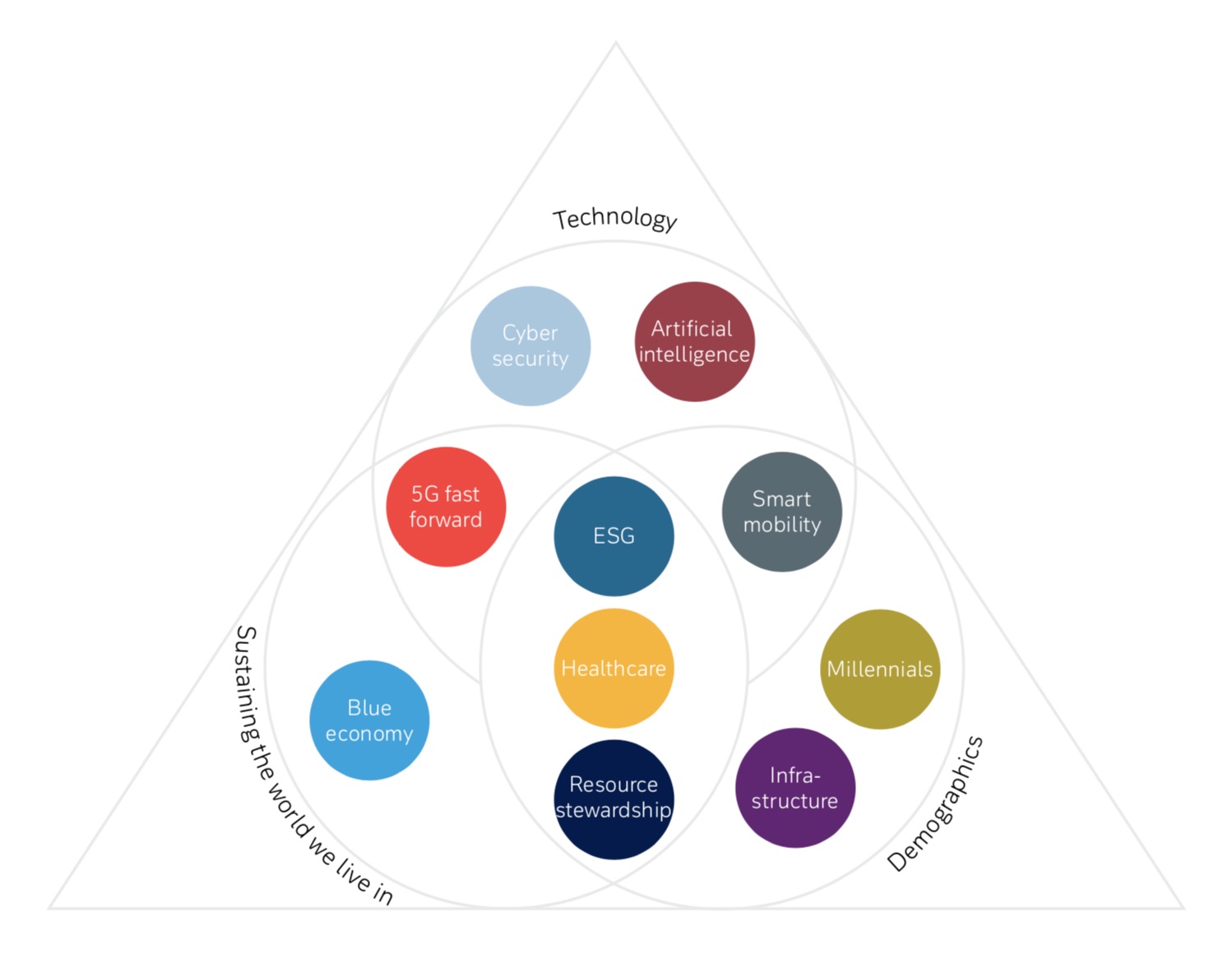
Our key investment themes: 2021 update
• Technology • Demographics • Sustaining the world we live in
We have been developing our key investment themes for five years. They are designed to have long-term relevance and to identify continuing investment opportunities. The ten existing themes can be visualised as sitting within a triangle bounded by the three dimensions of technology, demographics and sustaining the world we live in – or TEDS for short.
Artificial intelligence (AI)
- The coronavirus pandemic has encouraged more use of AI in multiple aspects of healthcare, e.g. disease and illness screening and diagnosis. AI also seems likely to play an increasing role in understanding climate change as well has having immediate application in mitigating it, e.g. through more efficient energy use. Financial sector use is also important. Increased computing power and storage will hasten its adoption, but there are multiple political risks.
Blue economy
- Ocean health is critical to biodiversity, the natural capital provided by our oceans and the preservation of socio-economic systems. The blue economy is threatened both by climate change and by other man-made problems such as overfishing but it also offers new and emerging investment opportunities. More investment is needed and will require new financing mechanisms and good governance to ensure a positive impact.
Cybersecurity
- Continued attacks at both a corporate and government level remind us of the need for cybersecurity, particularly given the centrality of digitalisation to both economies and critical infrastructure. The U.S. administration is pushing firms to step up cybersecurity efforts but some areas appear weak (e.g. the internet of things) and leading tech firms have recently pledged to increase spending.
ESG
- ESG lies at the centre of our key investment themes. The importance of risk management via environmental, social or governance-focused investments has been underlined by the coronavirus pandemic. More government commitments on environmental targets look likely as the scale of the problem is understood, with sectors such as biodiversity increasingly in the spotlight. The role of private sector investment is likely to increase.
5G
- 5G (and increasing talk around 6G) has implications for many sectors and may also facilitate AI. Building the 5G network involves a wide spectrum of economic activity, from demand for semiconductors and raw materials through to infrastructure provision of data centres and cell towers and effective cybersecurity. Political risks have been highlighted recently with some countries not keen to rely on China as a technology provider.
Healthcare
- Healthcare has been given even greater prominence by the pandemic but long-term drivers such as ageing populations and the increasing affluence of emerging markets are driving demand too. Technology continues to help drive transformation across care service provision, medical devices, pharmaceuticals and healthcare finance. Healthcare may be transforming into a life-long process of managing and maintaining individuals’ health.
Infrastructure investment
- Infrastructure needs are massive across both developed and developing economies. Traditional physical infrastructure is only one component of this: technological and other infrastructure is also key. We are likely to see further development of the public/private investment intersection, a greater focus on ESG in terms of project appraisal and also more creative use of technology at all levels.
Millennials
- Millennials are an increasingly important group in many economies in both economic and political terms. Investing here can most obviously focus on millennials’ consumption habits (e.g. on technology and entertainment). However, it is also important to consider the underlying issues that will define millennials’ working lives (e.g. demographics and debt) and that will have broad investment implications.
Resource stewardship
- Resource stewardship focuses (but not exclusively) on waste management, where technology is both a problem (through e-waste) and a potential deliverer of solutions. Familiar themes (e.g. alternative energy) pop up here too. But with government finances stretched, resource stewardship may have to battle for the financial commitments it needs: spending here is usually closely interlinked with economic cycles.
Smart mobility
- Smart mobility will involve progressive change across the whole of the transportation sector. At present, most attention is focused on the automotive sector and the four trends of electrification, connectivity, autonomous driving and on-demand or shared vehicles – although the concept is broader. Advances here will create investment opportunities around multiple sectors – from electricity provision to mineral resources.
Download full report
Our full CIO Insights report “Changing gear" includes economic forecasts for 2021 and 2022, along with individual asset class outlook summaries and forecasts to the end of September 2022. Please refer to the Important Notes at the end of the report for disclosures and risk warnings.


